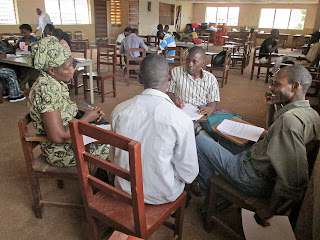SELI presented for a few hours at TISLL's (The Institute for Sierra Leonean Languages) Literacy Teacher/Facilitator Workshop, held Monday-Friday, May 27-31st in Freetown. The workshop trained people to teach literacy to nonliterate people in their mother tongue. Five different languages were represented.
On Wednesday, SELI introduced the idea that all classes are diverse: even in basic literacy classes there are always advanced learners that need to be challenged, and process writing can do this--a form of differentiated instruction. In this photo I'm presenting concepts, but then we went on to the practical: each participant drafted a personal piece of writing in his or her own language and then shared it in language groups in a content conference. It did not surprise us that many of the participants had never written a personal experience in their own language before. For nearly all Sierra Leoneans, the only road to literacy is through English. But the hardest part of the presentation was stopping the content conferences! Everyone was having such a good time being writers in their own language and having writing to share and discuss, that they didn't want to stop!
Five Writing Lessons (FWL) Collaborating with TISLL has shown SELI how to make its Five-Writing-Lessons project work. This project been a struggle. After the first two successful units, in Kuranko and Krio, we could not seem to move forward. Even repeated radio announcements did not attract educated Sierra Leoneans to this opportunity of becoming writers (and potentially one day, authors) in their own languages.
By way of contrast, TISLL already operates literacy centers in six languages where adults and young people gain literacy in their mother tongues. TISLL also has literacy materials and the expertise to teach literacy. It is the only organization in the country that works exclusively with indigenous languages. The difference is that unlike the SELI FWL program, TISLL literacy classes teach initial, beginning literacy. But what a great opportunity this provides us! Literacy that is not maintained, can be lost. What better way to empower and motivate TISLL's newly literate students than to include them in a writing workshop?
SELI is excited to be partnering with TISLL, and hope our contributors to the Five Writing Lessons project agree.










